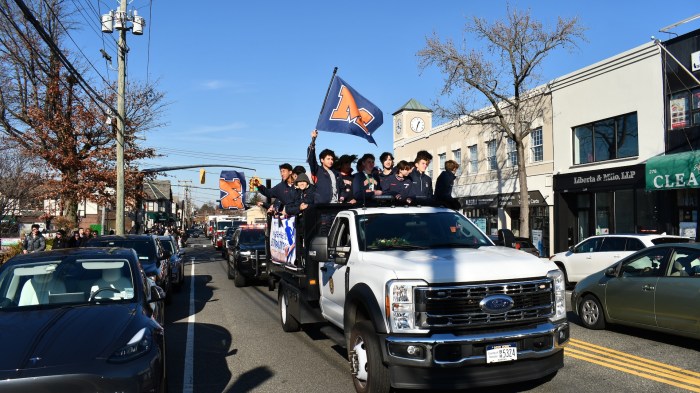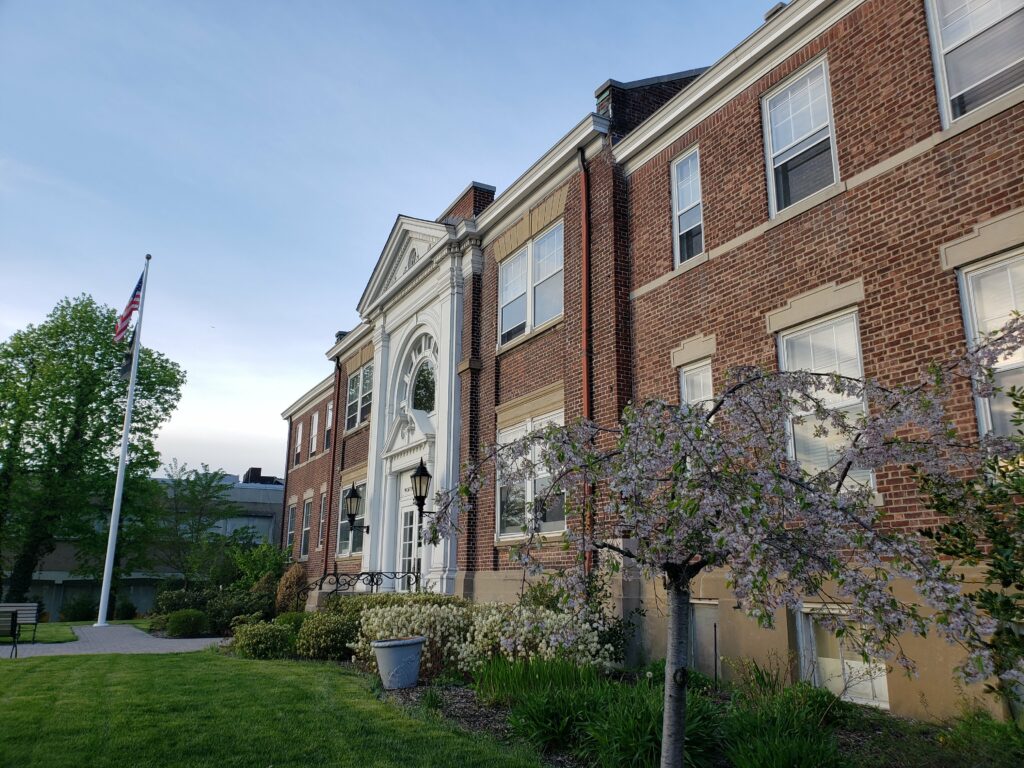
Unanimous vote after passionate debate
Editor’s note: The Manhasset Press published three articles about the process by which the Town of North Hempstead came to rescind a law governing its abortion zoning. We have combined all three articles into one, so we apologize if some portions of articles get repeated.
The decision to repeal an abortion zoning provision was unanimous. The Town of North Hempstead Board of Trustees rescinded Town Code Chapter 41-A, titled “Pregnancy Termination Facilities,” on Sept. 1.
Getting to that 7-0 vote, however, unsurprisingly exposed the vast gulf that exists on the issue as passionate proponents of both sides got to have their say. At times, the law itself was incidental as speakers brought up the usual tropes of “baby body parts” being taken away from abortion clinics by sanitation workers or women talking of the “bad” pre-Roe days.
For many, 41-A was an antiquated law, unenforceable and the result of the then-town fathers’ defiance of the state’s liberalization of abortion.
For those against rescission, the law guaranteed that women would be protected from unaffiliated abortion providers and enhanced their safety during a procedure they consider rife with potential complications.
Almost two-and-a-half hours were dedicated to Chapter 41-A at the public hearing and board discussion on Sept. 1. The law, enacted in 1971, one year after the state made abortions legal, regulated “pregnancy termination facilities” and mandated that they be affiliated with hospitals.
Discussion of the repeal of the law, sponsored by Councilwoman Veronica Lurvey, had taken up a big chunk of the Aug. 4 town board meeting as well.
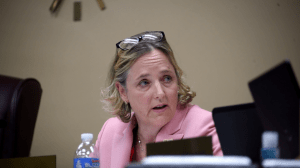
Before the Sept. 1 public comment, Supervisor Jen DeSena called Town Attorney John Chiara to the podium to discuss the legalities of 41-A. The attorney said that it has never been challenged, but a similar law in the Village of Hempstead from the same period had been overturned in 1972 by an appellate-level court after an abortion provider sued the village. The case was Robin v. Village of Hempstead.
He went on to note that New York State health and education laws govern what 41-A purports to regulate, and therefore it was contrary to state law.
The discussion soon involved electoral politics, with Lurvey wondering if a change in leadership in Albany would affect reproductive rights. Governor Kathy Hochul, a Democrat, is being challenged by Republican Lee Zeldin. The Democrats currently enjoy big majorities in both houses of the legislature, but history is filled with surprising electoral reversals.
Before public comment, Lurvey stated, “All local laws regarding abortions must be carefully scrutinized. Often in laws that seem on their face reasonable, the reality is that they are enacted with an ulterior motive, especially laws enacted in the early 1970s, as this one was. The law makes it illegal to perform an abortion, whether it is done medically using prescribed drugs or otherwise, unless it is performed in a hospital or a facility administered by a hospital or facility having a hospital affiliation agreement. The law is antiquated and does not take into consideration the availability of medical abortions. Now, due to the advances in the field of medicine, a woman can take medication prescribed by a doctor in the privacy of her own home. Chapter 41-A is not just antiquated, but it places an undue burden on a woman who may want to terminate her pregnancy as well as on the medical professionals performing the procedure.”
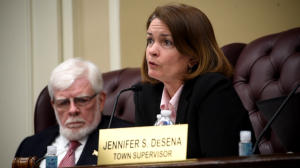
She added, “I would like to take a brief moment to clarify a few points. The repeal of 41-A is not a zoning change. As we heard earlier, medical offices or clinics that may offer abortion procedures will not be popping up all over the place in residential areas. The repeal of 41-A will also not result in the town funding of abortions. These are just some things that came through by email. There is confusion because we are in a post-Roe world following decades of certainty around abortion restrictions. We now have uncertainty. A woman vulnerable and faced with a difficult decision should not have to engage in legal analysis to determine which laws apply to her and which don’t. The town board has no business entering the procedure room or a woman’s medicine cabinet and getting involved in these types of decisions. The town should not have a say and should not be putting an undue burden on a woman’s right to choose.”
Before offering the resolution for a vote, Lurvey said, “Abortions, even in clinics, as we have heard, are governed by state law, which is stricter than we could ever put in place. A speaker a while ago asked us where we stand on a woman’s right to choose. I can now answer that I am proudly pro choice and I am optimistic that we will hear tonight that a majority of my town board members are as well.”
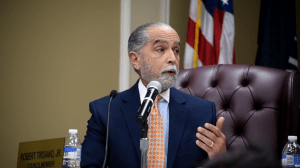
Councilman Robert Troiano stated, “I have listened intently over the last two hearing periods for I don’t know how many hours, and I’ve been impressed by the sincerity of all the speakers that have come, and I actually consider it to be a real honor to be sitting in my position now. And see how the American system of government works, that we can come together peacefully and have people express their thoughts on both sides of [the issue]. While I have been persuaded by the sincerity of the speakers that have come tonight, I am not persuaded by the arguments on both sides of the aisle.”
He went on to say that he represents a portion of the town—Westbury and New Cassel—where many lack access to health care because of poverty, jobs that don’t provide health coverage, or because they’re undocumented.
“As a society, we go to great lengths to provide adequate health care for everybody, but it doesn’t always work,” Troiano pointed out. “The hospital for them is the establishment, an institution where you go potentially to be deported. And that’s just a sad reality. That may not even be true, but that is their perception.”

Many in the audience, he pointed out, would have no problems accessing an abortion provider, but women in his constituency, “go to have a back alley abortion before they’re going to go to a hospital and risk having immigration come and take them from there.”
An independent abortion clinic, he argued, would present a safer environment and they would feel more comfortable than in a hospital or hospital-affiliated setting.
“I’ve heard the assertion that clinics are not safe,” he continued. “I’ve heard anecdotal evidence that clinics are not safe. But I’ve heard no data at all to support that. In contrast, we’ve heard ample evidence provided tonight that suggests, that indicates, maybe even proves, that clinics are just as safe an environment as our hospitals. I’ve also gotten this from my own view of talking to doctors and talking to practitioners. That a great deal of forethought goes into the serving process when someone comes in for a counseling session. So I’d like to say that I believe that a woman’s right to choice extends to where she gets her health care.”
Troiano concluded, “I vote yes to repeal 41-A,” as applause and cheers erupted.
Councilman Peter Zuckerman commented, “I’d like to really thank everyone for coming out for two long evenings. This could not have been easy for all of you. Everyone came out twice and you know, we did extend the hearing, because we wanted to hear from everyone and we felt that possibly there were people who couldn’t attend, who weren’t able to speak and we wanted to hear from them. And I’ve heard a lot of compelling things tonight and in the last meeting, and I think there always will be disagreements. But I think that the most important thing that we can do here is to make the decision that we feel is appropriate. And I feel that a woman’s right to choose is of the utmost importance and women should have the right to choose. I vote aye.”
Councilmembers Dennis Walsh, Mariann Dalimonte, David Adhami and Lurvey also voted yes, with Dalimonte noting, “Someone this evening asked if we were pro choice, and I want to let you know that I am pro choice and I vote aye. And thank you everyone for coming.”
Also voting yes was DeSena who stated, “I support the repeal of this chapter and vote yes for it brings North Hempstead town code into conformity with state law and removes a chapter of our code which is unenforceable and superseded by the New York Public Health Law.”
Zoned Out: North Hempstead abortion zoning debate
Whether you were on the pro-life or pro-choice side of the abortion issue, you did find a point of agreement at the Aug. 4 Town of North Hempstead Town Board meeting: the public hearing should continue.
Nearly two hours of that five-hour meeting had been spent discussing the proposal to rescind Chapter 41A, a provision in the town code enacted in August 1971, a year after New York State decriminalized abortion. It was titled “pregnancy termination facilities” and limited abortion clinics to hospitals or hospital-administered or -affiliated medical centers.
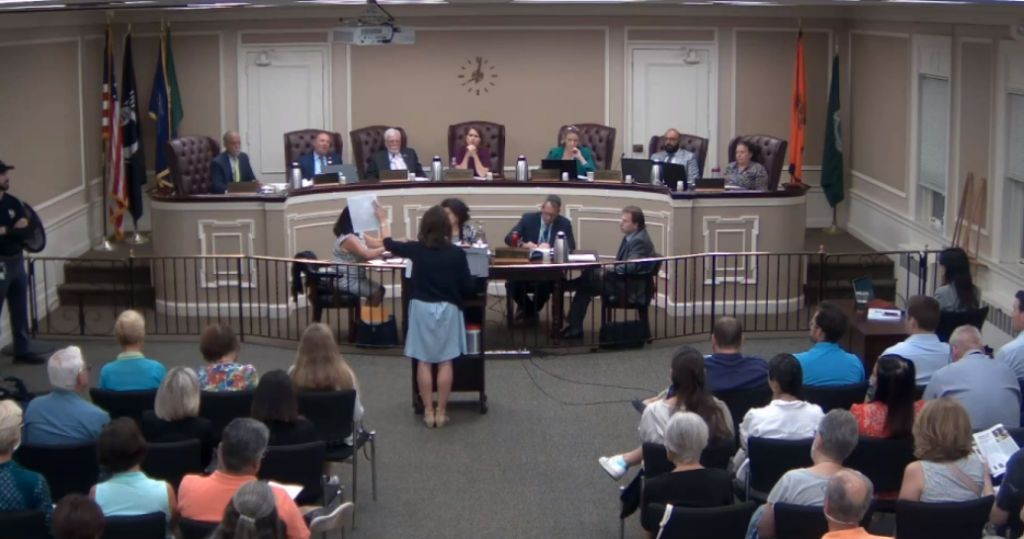
Councilwoman Veronica Lurvey, who introduced the proposal on an emergency basis, told the Manhasset Press that there was a feeling at the meeting that many still wanted to speak.
Karen Seltzer, board chair of Planned Parenthood of Greater New York, one of the last to address the issue, indicated that many people were not able to attend and wanted their say.
“I was sitting on the town board dais when she made that statement and there were many people nodding their heads and I thought that there’s a real desire on both sides to continue this discussion. So let’s do so and give the residents the opportunity to speak on what is obviously a very important topic,” Lurvey stated.
This being North Hempstead, politics was inevitably interjected into Lurvey’s proposal. At the meeting, Republican Councilmembers Dennis Walsh and David Adhami objected to extending the public hearing, calling for a vote that night, but they were outvoted.
Republican Supervisor Jen DeSena was away attending a yearly family reunion and had announced in a statement that she would vote to rescind 41A, but wondered why Lurvey was so anxious to have the hearing and vote, only to delay potentially rescinding what the councilwoman called a law that put up barriers on a woman’s right to choose.
“I was going to vote to rescind it because it was nullified by state law and it was unenforceable, so to spend the amount of time that they did on the hearing—and people flooded my email about it—to spend two hours on that and then not even vote really shows that this was political theater, this was not an urgent matter,” DeSena told the Manhasset Press. “Councilwoman Lurvey put that on as an urgent matter because she had already missed the deadline for the agenda. So we put it on at the last minute and then to not take action on it seemed to me a waste of town time and money.”
Walsh told the Manhasset Press that he thought the Aug. 4 public hearing “was captured by people who had an agenda on one side and on the other side of [the abortion] issue.”
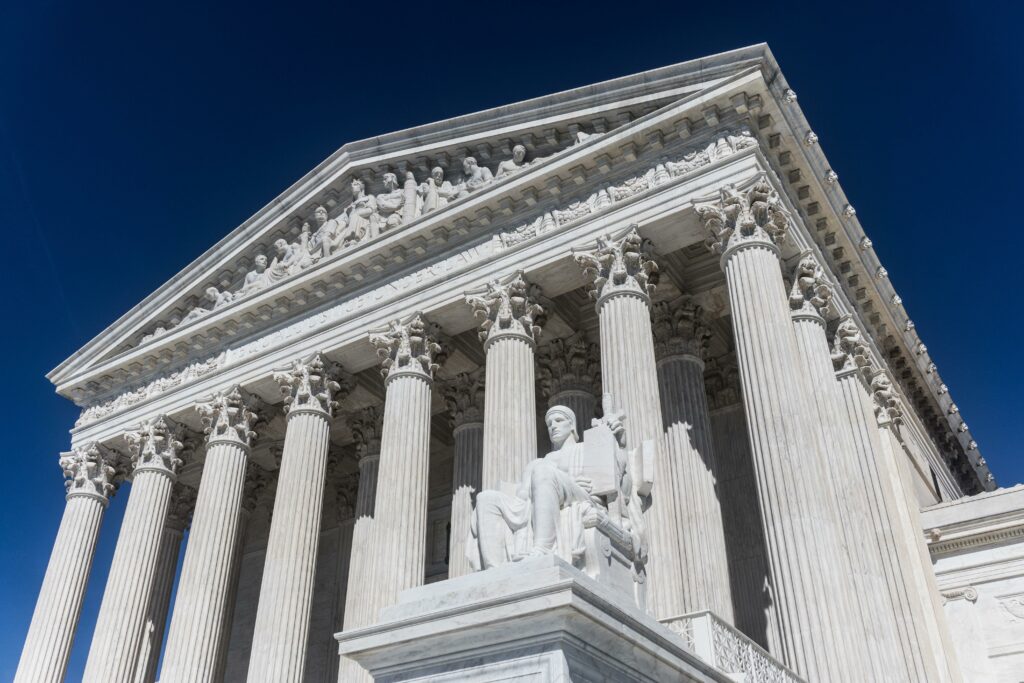
Walsh agreed with those who argued that it was a moot debate because he had been told by the town attorney’s office that the law was unenforceable. He even pushed back against people at the hearing that feared rescinding 41A would result in an influx of abortion clinics. Again, he was informed by town attorneys that this would not be the case.
The councilman charged that the hearing gave “people running for office a chance to pontificate,” noting that State Senator Anna Kaplan and Assemblymembers Charles Lavine and Gina Sillitti, as well as Congressional District 3 candidate Robert Zimmerman, spoke. All three state politicians are running for re-election this November and Kaplan and Zimmerman were several weeks away from a Democratic primary, which they both won.
“It is not a moot point in the current environment,” Lurvey responded in an interview, saying she was not surprised at the amount of people that showed up to weigh in on the zoning. “Many people have put it to me this way: ‘It’s unenforceable until it’s enforceable.’ In the current political environment can we really be certain about anything, including the leadership at the state level? We used to think that the state-level trigger laws were unenforceable. But then Roe was overturned by [the Supreme Court’s June 24] Dobbs [decision] and now they are enforceable.”
Of 41A she said, “I looked at it from this perspective, which I think is a real world perspective, and this is a type of local trigger law that we should not have on our books because we just don’t know in the current political climate what’s going to happen.”
Lurvey was asked how Chapter 41A came to her attention, given its obscurity and the fact that it was placed between Plumbing (41) and Public Parking Fields (41B) in the code. She laughed and said that it’s not even in the section of the code under the building department, which was charged with enforcing the provision.
“I was following what was happening at the Supreme Court with the Dobbs decision very closely and I saw that the local laws were becoming much more important,” Lurvey explained. “So I asked around and I talked to people about it, and in my conversations it came to my attention that what I’m going to call a trigger law is in the books in the Town of North Hempstead. I was absolutely shocked. Why would the town board [at the time] be weighing in on something like this? I talked to some people who were giving me their memories, people who were around at that time and they were expressing to me it was their feeling that this law was put in place to restrict access to abortions in the wake of what happened [in the state legislature].”
“What about the idea put forth by opponents of the rescinding 41A that there’s going to be an abortion clinic on every corner?” Lurvey was asked.
She replied, “Zoning rules already prohibit medical offices or other types of offices in many parts of the town. Rescinding this is not going to allow medical offices in residential neighborhoods or make any drastic changes like that. It’s a scare tactic. It’s just not accurate.”

To the charge that the vote should have been taken Aug. 4 without extending the public hearing, Lurvey replied, “We continue public hearings all the time. We err on the side of letting people speak. We don’t want to move on while there’s still a lot to be said on the topic. We do that with stop signs. We do that with site plans reviews. We do that with all sorts of public hearings. It’s routine. I don’t know why we should deal with this one any differently.”
Councilman Robert Troiano (D–Westbury) acknowledged that 41A is obscure and unenforceable, but was not surprised at the turnout on Aug. 4.
“This is an issue that people on both sides of the pro life and pro choice debate are passionate about and they’re going to come out and speak their mind and have their voice heard,” he said in an interview. “So we’re going to have a second public hearing on Sept. 1 to make sure everybody gets a second bite of the apple.”
Even in the unlikely event that 41A is not repealed, Troiano stated, “If anybody ever challenged it, they would win in court because it is superseded by state law.”
It Was Much More Than About Zoning
Ostensibly, the Aug. 4 public hearing was to discuss removing from the Town of North Hempstead town code an obscure and anachronistic provision governing the locations of what it called “Pregnancy Termination Facilities.”
But the town board meeting turned into a passionate debate over that most contentious of issues, abortion, just weeks after the Supreme Court overturned Roe v. Wade in its Dobbs decision.
Councilwoman Veronica Lurvey had introduced the local law to eliminate from the code Chapter 41A, introduced in 1971. The previous summer, just three years before the momentous Roe decision, New York State had decriminalized abortion. A year later North Hempstead added to its code the requirement that abortion providers had to be affiliated with a hospital. The code provided for the building department enforcement of the provisions as well as penalties.
Introducing her resolution, Lurvey stated, “The 1971 town code is antiquated and places an undue burden on a woman who may want to terminate her pregnancy, as well as on medical professionals performing the procedure. Those who seek an abortion today are doing so in an increasingly confusing and frightening climate and the Town of North Hempstead does not want our code to contribute to that confusion. Though currently this provision is preempted by state law, we need to make sure that women can access the health care that they need in the [town].”
She continued, “We need to make sure that women continue to be able to access the health care they need, no matter what happens on the state level. In short, the town should not be putting up barriers on a woman’s right to choose. The North Hempstead town board should not have a say on this issue.”
Her remarks elicited cheers and hoots and applause.
Lurvey recognized that it was a passionate issue and pleaded for tolerance of differing views. She added that the town had received 51 emails in support of repealing 41A, including ones from North Shore Reconstructionist Synagogue Rabbi Lee Friedlander and Cantor Eric Schulmiller. In addition, it had the support of the League of Women Voters of Port Washington-Manhasset and the League of Women Voters of Great Neck, and various members of Hadassah, the women’s Zionist organization.
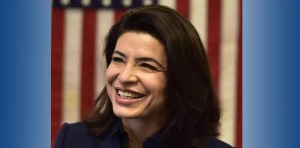
The long list of speakers began with NYS Senator Anna Kaplan (D–North Hills), who supported “today’s resolution repealing a section of the town code that places unlawful barriers between women and the right to have an abortion. This isn’t just about cleaning up an old law. This isn’t just about righting an historical injustice. This is about standing up for women. This is about standing up for our rights to make decisions for ourselves. And this is about sending the message that we will always stand up for women in the Town of North Hempstead.”
She added, “Our extremist Supreme Court [overturned] 50 years of established precedent and [stole] our constitutional right to choose. We’ve all had to learn a tough lesson that we can’t sit back and expect that things will be okay here just because we live in a place where our rights are protected. We’ve seen that there are people who will stop at nothing to assert their control over women’s bodies. And the only people who can stop them are those of us who are willing to stand up and do the right thing.”
Deputy Supervisor Joseph Scalero, who presided over the meeting in the absence of Supervisor Jennifer DeSena—who had a long-standing family commitment—had to chide an attendee who tried to interrupt Kaplan while she spoke.
Kaplan concluded, “This is a moment for us to steel our resolve and fight for our rights and not back down in the face of extremists in New York,”

Assemblyman Charles Lavine (D–Glen Cove) said, “Unfortunately, like it or not, national politics have become state politics. And national politics have become local politics as well. I am very proud to be here this evening with my wife Ronnie, who was a very proud Planned Parenthood volunteer and I will share with you that in the years she worked at the Planned Parenthood Center in Hempstead I worried about her safety every single day she went there, and I worried about the safety of everyone else who worked in that wonderful facility.”
As chair of the Assembly Judiciary Committee, Lavine said he was proud of his role in the adoption of bills that Governor Kathy Hochul signed to protect abortion rights. He recalled from his childhood a classmate who got pregnant in sixth or seventh grade and gave birth to a baby.
“That was a world in which children were forced to bear children,” he observed. “There are those today who want to return us to that world. And I pledge this to you. As long as I serve in public office, I will do everything to stop us from returning to that world.“
He affirmed that 41A was a reaction by then-town leaders to the passage of the state’s abortion law, and argued that it should be repealed.
The repeal also had the support of Assemblymember Gina Sillitti (D–Port Washington), who stated, “There has been a slow, steady assault on women’s rights across our country. With the recent Supreme Court decision, the courts have said women don’t get to decide what happens with their own bodies. Instead, leaving it in the hands of state legislatures to decide the fate of women. I’m proud to represent a state that protects a woman’s right to decide what happens to her own body and one that values women and not controls them. A state that also empowers reproductive health care providers, and safeguards them from retaliation. Women will travel to New York for health care, and we will protect them. In the last days of our legislative session in June, we passed a series of bills to do just that.”
She added, “Now we look to our local municipalities to do the same. I’m thankful that my own Town of North Hempstead is leading the way in this effort with Councilwoman Lurvey’s resolution tonight. I hope that what you’re doing here will encourage other towns to do the same. We have to make sure every loophole is closed and closed tight.”
Pro/Contra
Florence Scarinci of Franklin Square called herself “a pro life feminist” and said she belonged to an organization called Feminists Choosing Life of New York.
“Contrary to common opinion, pro life people are concerned about the life of the mother as well as the baby,” she affirmed. “I am deeply concerned that the repeal of 41A, which requires an affiliation with a hospital and an operating certificate, will have ramifications for the health of the mother. The certificate ensures that certain requirements are met, and these requirements include that a doctor have admitting rights to a hospital, and that there be a policy and procedures in place for the transfer of women who during an abortion have an untoward episode. We all know that during surgery, anything can happen. It doesn’t matter how well prepared you are or how often the doctor has done the procedure. Things happen. People are allergic to anesthesia. There are undiagnosed bleeding complications and it is imperative that a doctor be able to transfer a woman to a hospital where she can be seen immediately. That is a life-saving procedure. Why you want to repeal 41A is beyond me. I find that it’s a safety net for a woman having an abortion.”
Scarinci was afraid that the repeal of the law, along with the state being “open” for abortion and drawing women from states where there are total abortion bans, will result in a proliferation of unsupervised clinics in the town.
“New York State prides itself on protecting women’s reproductive health. How does repealing this provision serve and protect women’s reproductive health?” Florence wondered, arguing that it makes abortions less safe and less rare.

Jim McHugh of New Hyde Park said he was a pharmacist in a Queens hospital and called himself pro life. He said he saw ads in the subways from the governor touting that abortion in the state was “safe, legal and accessible forever.”
“I think we can maybe downgrade safe if we eliminate 41A,” McHugh asserted, going on to say that he had closely studied the town zoning and concluded that without that provision, it would lead to a proliferation of clinics unaffiliated with a hospital.
He and his wife Bernadette both worked for hospitals, “[which] have very stringent procedures and inspection because they’re liable if something goes wrong for women undergoing an abortion procedure with them. And there’s going to be a lawsuit like you wouldn’t believe.”
His wife was an expert in hematology and coagulation, and McHugh warned that women are at risk of bleeding during abortion procedures.
He did not want to see North Hempstead become an abortion destination, he said, criticizing the governor for making money available to fund abortions for out-of-state women.
Robert Zimmerman of Great Neck dismissed the idea that 41A was unenforceable, stating, “Nothing is guaranteed. Nothing is protected and we can never drop our guard. Especially when it comes to standing up for women’s health, saving women’s lives and women’s personal autonomy.”
He decried the assault across the country on women’s freedom and the LGBTQ+ community “and so many other segments of our society by extremists in our legislatures and courts. The reason it’s so important to repeal Chapter 41A is because laws change, courts change, governments change. We all know too well that laws can be modified and governments change and all of a sudden, Chapter 41A can be used as it was intentionally originally, to harass women to make it more difficult for women to seek counseling and health care. That’s why it was all put in place in the first place, to undermine state law, to make it more difficult for women to have reproductive rights, abortion rights and personal access to abortion care.”

Zimmerman is running against Republican George Santos of Queens to succeed the retiring Tom Suozzi (D–Glen Cove) in the Third Congressional District.
Lauren Garfinkel of Port Washington attended on behalf of the National Council of Jewish Women, and said, “I would like it to be put on the record that we also support the repeal of this law. It’s really important to note that 93 percent of abortions happen before 13 weeks of pregnancy. As [Jim McHugh] said earlier, the further into pregnancy an abortion happens, the more likelihood there is a complication. Only 6 percent occur between 14 and 20 weeks and only 1 percent after that. What [41A] would do if it were in effect, is place an undue burden on pregnant people who can only get to this one or two hospital-affiliated clinics.”
She went on to assert that abortion, “when provided by professionals who have practiced it for many, many years, as most abortion healthcare professionals I know have, is a very, very safe procedure, as safe as going for oral surgery, many of which are very often performed outside of a hospital setting.”
Garfinkel added, “I would just like to say that in the religion of Judaism, as I am an observant Jewish woman, abortion is permitted and sometimes required if the health of the pregnant person is at stake. And that’s not just the physical health, the mental and emotional health are important as well. And we believe that this does not only extend to Jews, but this extends to all people because the dignity of all people is what is paramount. I would like to just state that because of this very important religious freedom issue, the Town of North Hempstead should align with the State of New York and the expanded access that the governor has provided. Get rid of this antiquated law and bring democracy back to the people.”
Nina Gordon argued against the necessity of hospital affiliation, asserting, “I believe there has been an operating abortion clinic in North Hempstead, probably one of the longest operating ones in New York State that is not affiliated with the hospital. There are countless places where medical procedures are performed out of a hospital and this has been the case for many many years. So I just want to debunk all of those claims that it is necessary to be in a hospital. And I also want to offer a personal story about my abortion because my abortion was in a hospital and it was a horrible experience. It was a medical abortion in 1981. So hospitals are not always the best answer. I’ve seen great care in hospitals. And I’ve seen horrible care in hospitals.”
She added, “I think that as Assemblyman Lavine said earlier, times change, things have changed. Fifty years ago, when Roe v Wade was passed, we didn’t have abortions available through medication, they were all surgical procedures. So I think we need to move forward with the times and I applaud Councilwoman Lurvey for bringing this forward. And I think we all need to take a deep breath and remember that this legislation is not about pro life or pro choice. This is about removing the restrictions on a medical procedure and bringing it in line with the rest of medical procedures and 2022.”
Jay Randolph Hunbertmark called himself a longtime resident of the Town of North Hempstead and said, “I’m here to voice my opposition to the repeal of chapter 41A. I believe it is vital for the health and safety of the women of the Town of North Hempstead. I think it is incumbent upon the town that they ensure that [facilities] have the proper equipment and expertise to address emergencies and situations that might arise from this procedure. I think it’s also incumbent upon the town to protect our future fellow citizens who may be born alive during this procedure, and that [facilities] also have the expertise and equipment necessary to save their lives.”

Karen Seltzer, town resident and the board chair of Planned Parenthood of Greater New York, said, “We are in a moment of crisis in this country. On June 24, the Supreme Court overturned Roe vs. Wade, ending almost 50 years of precedent, the constitutionally protected abortion care. This decision highlights that the right to abortion is not safe. Chapter 41A is confusing and misleading, and I’m told unenforceable. The Town of North Hempstead should not be putting up any barriers to people seeking essential health care and abortion is essential. We’ve seen the immediate and devastating impact this decision has had across the country. In many places, confusion and fear of prosecution have forced clinicians to limit patient access to life-saving abortion care. Here in New York, thanks to our state legislature, abortion remains legally accessible. State laws pertaining to abortion are now part of the public health law in New York, and they preempt any town code. As more states move to restrict abortion, we must be ready to welcome all of those who traveled to our state for care while also supporting those in need of care in our communities. Please vote to rescind this code and take a stand in support of access to abortion care.”
Councilman Robert Troiano, after the last speaker, moved that the hearing on the proposed law be continued at the Sept. 1 town board meeting because he felt that not everyone had been heard on the topic. Republican trustees Dennis Walsh and David Adhami objected and wanted to vote that night, but they were outvoted.
DeSena, in a statement, said, “Although I was unfortunately unable to be there in person for the public hearing due to a long-standing prior family commitment, I support the repeal of this chapter and would have voted yes for it, as it brings North Hempstead’s town code into conformity with state law, and removes a chapter of our code which is unenforceable and superseded by the New York Public Health Law.”
The Law and Court Decision
The following is the text of the North Hempstead law that was rescinded:
§ 41A-2 Places permitted
Any statute, law, ordinance, rule or regulation to the contrary notwithstanding, “justifiable abortional acts” as defined in the Penal Law of the State of New York, shall be performed only in a hospital having an obstetrical, gynecological or surgical service and having a valid operating certificate from the New York State Department of Health or in a suitably equipped and staffed facility administered by such hospital or in a suitably staffed and equipped facility having a hospital affiliation agreement acceptable to the State Hospital Review and Planning Council.
§ 41A-3 Use of unauthorized buildings
If it is found that any building or structure, except where authorized and permitted pursuant to § 41A-2 above, is being utilized for and equipped with facilities for acts of abortion, the Manager of the Building Department shall notify the owner of the property, the owner’s agent, lessee or occupant to immediately cease and desist the use of said building or structure, such order and notice shall be in writing and may be served upon the person, firm or corporation to whom it is directed either by delivering it personally to him or his agent or by posting the same upon a conspicuous portion of the building or structure where the act is being performed. Thereupon, such use shall immediately be terminated.
§ 41A-4 Penalties for offenses
A. Any person, firm or corporation who shall violate any provision of this ordinance or who fails to comply with any requirement thereof or with any notice, order or directive hereunder shall, upon conviction be guilty of a misdemeanor punishable by a fine not exceeding one thousand dollars ($1,000.00) or by imprisonment for not more than fifteen (15) days, or by both such fine and imprisonment.
B. Each day such violation shall be permitted to continue shall constitute a separate offense.
C. The imposition of penalties herein prescribed shall not preclude the town from instituting an appropriate action in law or in equity to prevent the performance of a justifiable abortional act in any building other than a hospital or facility duly licensed and accredited under New York State Department of Health, and having equipment and facilities acceptable to the State Hospital Review and Planning Council.
The Village of Hempstead implemented a similar law at around the same time, and was sued by an abortion provider pioneer, Bill Baird. In 1965 he opened the first abortion clinic in the country, the Bill Baird Institute, in the village.
In a non-jury trial in October 1971, the Nassau County Supreme Court ruled with the village after a lawsuit initiated by Baird.

On appeal, the Supreme Court Appellate Division, Second Department, reversed the decision and invalidated the village ordnance. The judges wrote, “…in view of state statute providing that an abortional act is justified when committed on female with her consent by a duly licensed physician acting within 24 weeks from commencement of her pregnancy, village ordinance requiring that a justifiable abortion be performed in a duly licensed and accredited hospital having equipment and facilities acceptable to the State Hospital Review and Planning Council was invalid as not within the power of village.”
The written opinion continued, “As conceded by appellants, there is a reasonable basis for finding that abortions, whatever the duration of the pregnancy, may more safely be performed in hospitals where extensive medical facilities are readily available. Thus, it would be well within the police power of the state to impose such a restriction.
“In our opinion, however, the enactment of this ordinance was outside the scope of the powers of a village. It is axiomatic that municipal corporations are creatures of the state and have only such powers and authority as are delegated by the state and as are necessarily incident thereto. The state has not conferred the power upon a village to enact an ordinance of this kind.
“The state has retained unto itself the power to regulate the practice of medicine…. It must be concluded that the power to enact this ordinance has not been conferred upon the village either directly or by implication.”
—Information provided by the Town of North Hempstead




